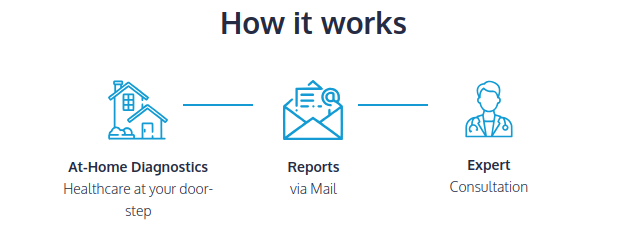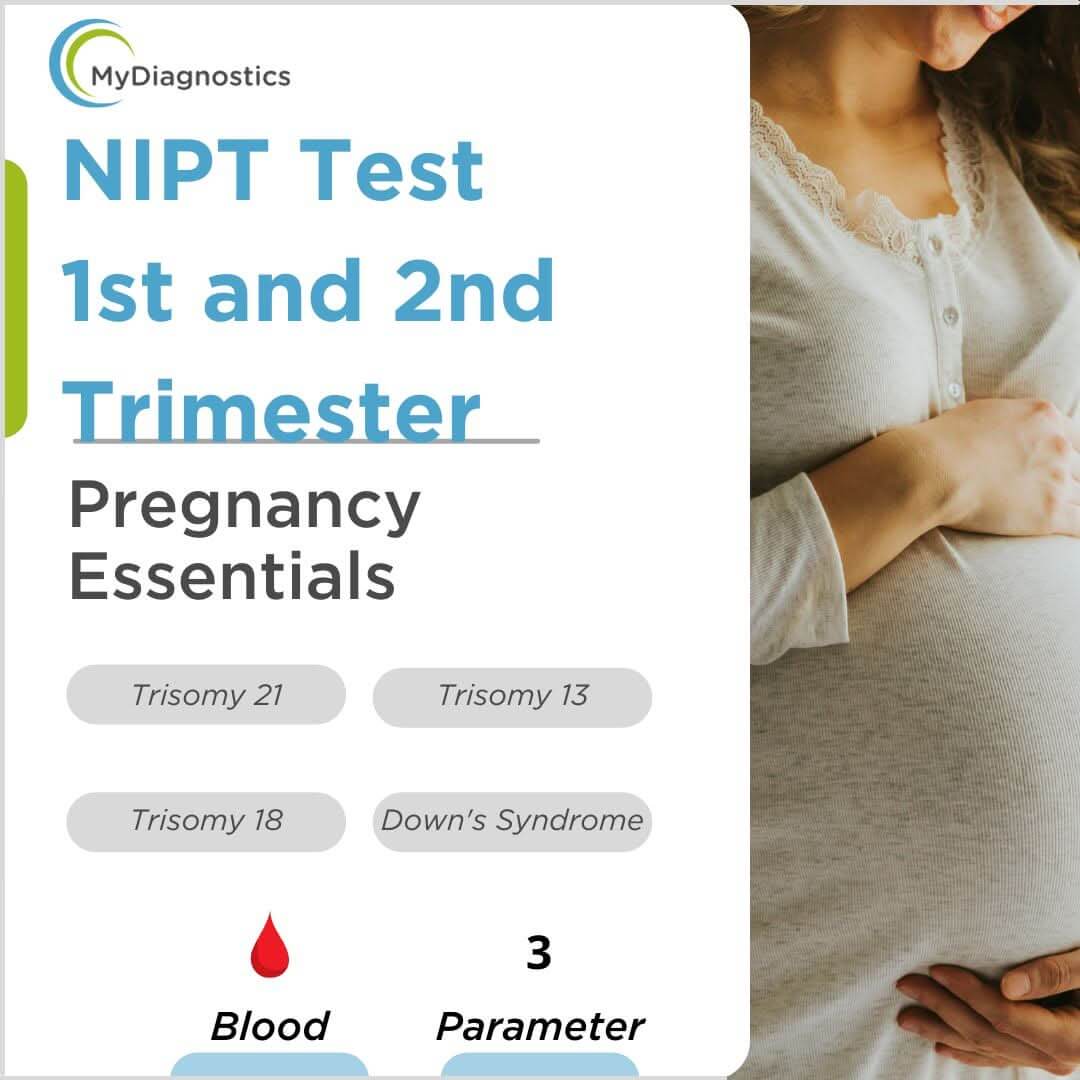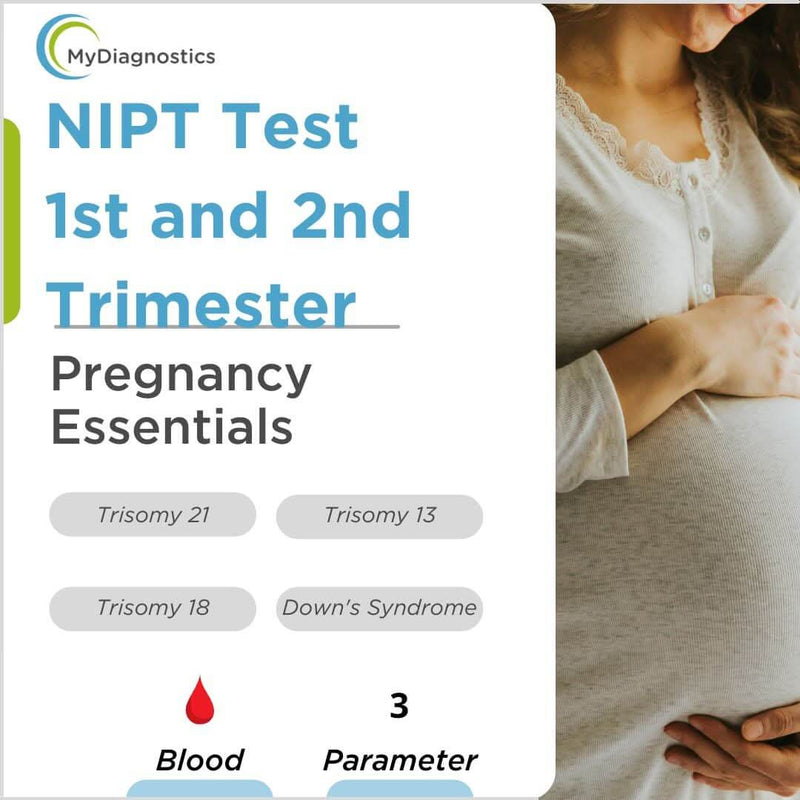NIPT Test in India: Cost, Accuracy & Details of Non-Invasive Prenatal Testing
Test Parameters

Understanding NIPT: A Comprehensive Guide for Expectant Parents
What is the NIPT Test?
Welcome, expectant parents! If you’re exploring options for prenatal screening, you’ve likely come across Non-Invasive Prenatal Testing (NIPT), also sometimes called Non-Invasive Prenatal Screening (NIPS). At MyDiagnostics, we understand you want the best for your baby, and NIPT offers a safe and highly accurate way to assess the risk of certain chromosomal abnormalities early in your pregnancy. This advanced test is a crucial part of prenatal testing NIPT solutions.
NIPT is a sophisticated blood test that analyzes tiny fragments of cell-free DNA (cfDNA) from the placenta that are present in your mother's blood. Since placental DNA is generally identical to your baby’s fetal DNA, this test provides valuable insights into the developing fetus’s genetic health as a form of genetic testing. It’s truly “non-invasive prenatal testing” because it is performed using a simple blood sample from the pregnant woman's blood, avoiding procedures like amniocentesis, which carry a small risk. This non invasive prenatal approach ensures safety for both mother and fetus.
This advanced prenatal testing solution is designed for screening a range of chromosomal abnormalities, giving you peace of mind or early information for planning. The test provides critical results for pregnant women.
How Does the NIPT Test Work?
The process for the NIPT test is remarkably simple blood collection and convenient. A small blood sample (approximately 10 ml) is collected from the pregnant woman's blood, usually from your arm in a specialized tube. This sample contains both your DNA and fragments of your baby’s DNA from the placenta. Our NABL (National Accreditation Board for Testing and Calibration Laboratories) certified laboratory then uses advanced technology to analyze this cfDNA. By measuring the levels and proportions of DNA from different chromosomes, we can assess the risk factor for various genetic conditions.
NIPT is one of several prenatal screening tests available during pregnancy, offering a non-invasive and highly accurate option compared to traditional screening tests. This test represents a significant advance in prenatal screening.
What Does the NIPT Test Detect?
MyDiagnostics offers NIPT in different variants to cater to your specific needs: NIPT Basic, NIPT Advanced, and NIPT Basic Twin. Each variant screens for different sets of conditions, providing comprehensive insights into your baby’s chromosomal health. NIPT can detect certain genetic abnormalities and genetic disorders in the fetus, helping identify potential health issues early in pregnancy.
Here’s a breakdown of what the NIPT test primarily screens for, including chromosomal disorders and other genetic disorders:
Chromosomal Aneuploidies: Trisomy 21 (Down Syndrome), Trisomy 18 (Edwards Syndrome), Trisomy 13 (Patau Syndrome)
These are the most common conditions NIPT screens for. They occur when there's an extra copy of a chromosome.
- Trisomy 21 (Down Syndrome): Characterized by an extra copy of chromosome 21, leading to intellectual disability and distinctive physical features. Getting information about like Down syndrome is a key reason for this test.
- Trisomy 18 (Edwards Syndrome): Caused by an extra copy of chromosome 18, often associated with severe intellectual disability and multiple birth defects, with a high mortality rate in infancy. This includes syndrome Edwards or syndrome Trisomy 18.
- Trisomy 13 (Patau Syndrome): Resulting from an extra copy of chromosome 13, this is a very severe condition causing profound developmental issues and severe physical abnormalities, often leading to miscarriage or early death. Information on trisomy 13 Patau syndrome is vital.
Sex Chromosome Aneuploidies (Included in NIPT Advanced)
Our NIPT Advanced panel extends screening to include conditions related to the sex chromosomes:
- Monosomy X (Turner Syndrome): Occurs when a female has only one X chromosome.
- XXY Syndrome (Klinefelter Syndrome): Affects males who have an extra X chromosome.
- Triple X syndrome (XXX): Affects females with an extra X chromosome.
- XYY Syndrome (Jacob's Syndrome): Affects males with an extra Y chromosome.
Microdeletions (If applicable to MyDiagnostics' offering)
Some advanced NIPT panels can also screen for specific microdeletion syndromes, which are caused by tiny missing pieces of a chromosome. (If your NIPT Advanced includes specific microdeletions, list them here. Otherwise, you can remove this subsection entirely or state that this is not part of your current offering.)
Determining Fetal Gender
Yes, the NIPT test, particularly the Advanced variant, can indeed reveal your baby's gender. By analyzing the sex chromosomes (X and Y), the test monitors chromosomal conditions that can also indicate your baby's sex. If you opt for a comprehensive NIPT package, you can gain insights into fetal gender, which is a common query about "nipt test gender." This non invasive prenatal approach provides extensive results.
What the NIPT Test Does NOT Detect (Important Distinction: Screening vs. Diagnostic Test)
It’s crucial to understand that NIPT is a screening test, not a diagnostic test. This means it assesses your baby’s risk of having a chromosomal abnormality, but it does not provide a definitive diagnosis. Noninvasive prenatal testing analyzes fetal DNA from maternal blood to screen for conditions like Down syndrome, but it cannot confirm a diagnosis. This test is for screening.
- Not a Diagnostic Test: NIPT cannot definitively tell you whether your baby has a chromosomal condition. A positive NIPT result indicates a high risk and should always be confirmed with a diagnostic test, such as chorionic villus sampling (CVS) or amniocentesis. Diagnostic tests are definitive procedures that follow noninvasive prenatal testing if a high risk is detected, providing conclusive results. If you receive a positive NIPT result, getting a diagnostic test to confirm the findings is critical.
- Doesn’t Detect All Conditions: NIPT is designed to detect specific chromosomal abnormalities. It does not detect autism or all possible birth defects or other genetic conditions caused by smaller DNA changes or structural abnormalities not related to whole chromosome number. If a birth defect is suspected, further specialized diagnostic testing beyond NIPT may be recommended by your healthcare provider.
Normal, Abnormal, False Positive & False Negative NIPT Results
Understanding your NIPT test results is key to making informed decisions. The results help you understand the risks of chromosomal abnormalities and are typically reported as either “low risk” or “high risk” for specific chromosomal abnormalities.
Understanding Your NIPT Results
- Low Risk: If your NIPT results indicate a low risk for a chromosomal abnormality, it means the chance of your baby having the condition is very low. This often provides significant peace of mind.
- High Risk: If the NIPT results indicate a high risk for a chromosomal abnormality (like Down syndrome, trisomy 18, or trisomy 13), it means the risk is higher than average. However, remember this is a screening result, not a diagnosis.
- Accuracy for Down Syndrome: The accuracy of NIPT for Down syndrome is remarkably high, with estimates nearing 99% accuracy. This high sensitivity and high negative predictive value mean NIPT is very good at identifying pregnant women who are at low risk of having a baby with a chromosomal abnormality.
False Positive and False Negative Results
While NIPT is highly accurate, no screening test is 100% perfect:
- False Positive: This occurs when the NIPT result indicates a high risk, but the baby does not actually have the condition.
- False Negative: This is less common but occurs when the NIPT result indicates low risk, but the baby actually has the condition. The accuracy depends on several factors, like gestational age and the specific NIPT test being used.
- What to Do After a High-Risk NIPT Result
In the event of a positive or high-risk NIPT result, your healthcare provider will typically recommend a diagnostic test, such as chorionic villus sampling (CVS) or amniocentesis, to confirm the diagnosis. These tests offer more definitive answers. We also recommend discussing your results with a doctor or seeking nutritional consultations for holistic well-being related to your pregnancy.
Why Choose MyDiagnostics for Your NIPT Test in India?
At MyDiagnostics, we are committed to providing you with reliable, convenient, and affordable prenatal screening solutions in India.
MyDiagnostics' Commitment to Quality and Convenience
We pride ourselves on offering the best NIPT test cost without compromising on quality or convenience. Our services are optimized for:
- At-Home Sample Collection: Experience the ease of testing right from your residence, eliminating the need to travel to a clinic.
- NABL Certified Laboratories: Your blood sample is processed in a National Accreditation Board for Testing and Calibration Laboratories (NABL) certified lab, ensuring the highest standards of quality testing and analysis.
- Fast Turnaround Time: NIPT test results are typically delivered within 15 days, providing you with timely insights into your baby's health during pregnancy.
NIPT Test Process: From Preparation to Results
Getting your NIPT test done with MyDiagnostics is a seamless experience designed for your comfort. This test makes prenatal screening easy.
Who Should Consider the NIPT Test?
While NIPT is recommended for all pregnant women, it is particularly recommended for those at an increased risk of having a baby with a chromosomal abnormality. You might consider NIPT if:
- You are above 30 years of age (advanced maternal age).
- A high risk for abnormality was found through previous serum screening (like Dual or Quadruple Marker Test).
- Certain abnormalities are identified on ultrasound.
- There is a family history of chromosomal conditions or birth defects.
- You have had a previous child with a chromosomal disorder.
- A couple has a history of infertility or recurrent pregnancy loss (miscarriages or stillbirths).
The American College of Obstetricians and Gynecologists (ACOG) provides guidelines recommending that NIPT be offered to all pregnant women, regardless of risk factors. The decision to have an NIPT test is a personal one, made in consultation with your healthcare provider, including obstetricians and gynecologists who are key professionals in recommending and interpreting NIPT. This test provides valuable genetic insights.
When is the Best Time to Take the NIPT Test?
The NIPT test pregnancy screening can be performed as early as 10 weeks of pregnancy, with the optimal window being between 10 to 14 weeks of pregnancy. Screening as early as 10 weeks allows for earlier detection of chromosomal abnormalities, giving expectant parents more time for follow-up discussions or additional tests if needed. While it can sometimes be done up to 17 weeks of pregnancy, the 10-14 weeks of pregnancy window is generally considered ideal for optimal results.
How to Prepare for Your NIPT Blood Test
Good news! There are no special requirements for the NIPT test, such as fasting. You just need to follow the instructions of our technician regarding certain genetic tests. Key information and documents will be required during the blood sample collection stage.
What to Expect During the NIPT Sample Collection
Our trained technician will visit your residence at your scheduled time. They will collect a venous blood sample (about 10 ml) in a streak tube. You will need to provide basic details and documents, including your Ultra Sound report (USG), any Dual and Quadruple Marker Reports, and Photo Identification Proof. Your sample containing cell free DNA cfdna will then be sent for analysis.
How Long Do NIPT Results Take?
Your NIPT test report will be generated within 15 days of sample collection and delivered directly to you, often via email for your convenience.
NIPT Test Cost in India
MyDiagnostics strives to make high-quality non-invasive prenatal testing accessible and affordable across India.
MyDiagnostics NIPT Test Price in India
The non-invasive prenatal testing solution effectively screens for chromosomal disorders by analyzing fetal DNA and cfDNA. The NIPT test cost in India from MyDiagnostics ranges from INR 12,500 to INR 17,500 based on the type of test opted for, highlighting its affordability. The report for NIPT testing is generated within 15 days, giving you complete insights into your NIPT test result.
The NIPT test cost is also optimized for at-home blood sample collection from maternal blood, and complete screening for a range of conditions. The NIPT test cost in India is also inclusive of critical screening parameters required for all expecting mothers, offering transparent nipt test price in India. This test is a valuable investment in prenatal care.
About the Quality
Quality assurance is done at 3 levels
- Sample collection from home using one time sealed QR coded sterile kits and transportation to the lab including the temperature condition requirements
- Sample acceptance and QC at the lab
- Sample run at the NABL/CAP/ISO certified labs - Medgenome







